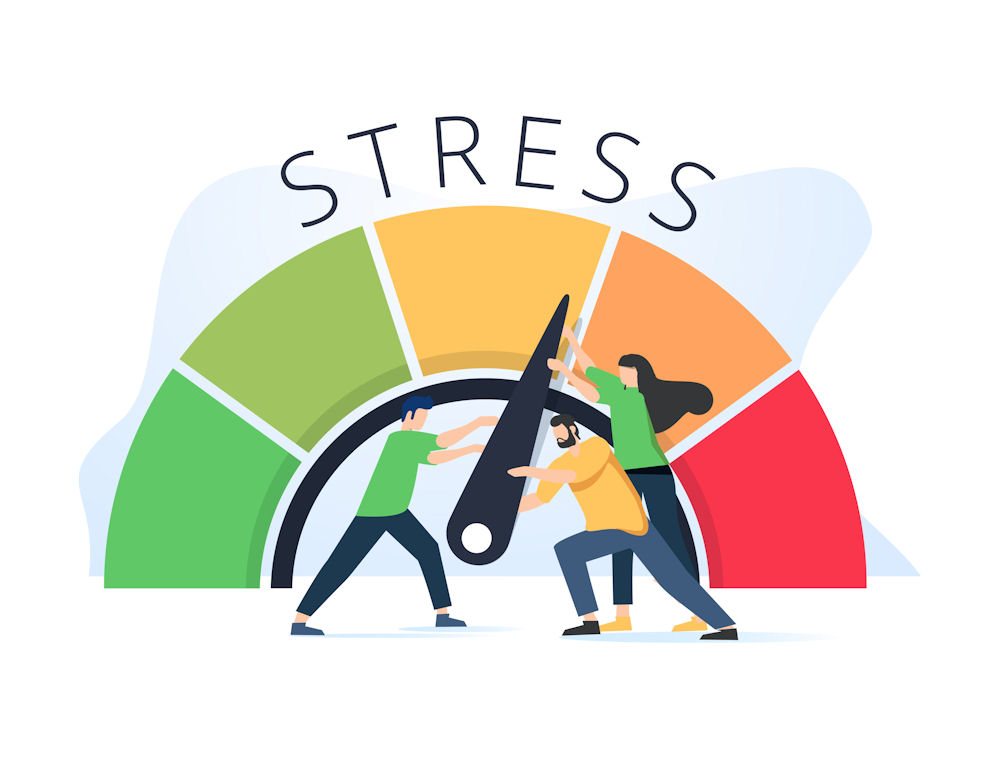Substance use disorders are classified as chronic conditions, necessitating a long-term treatment approach that incorporates strategies for managing relapse triggers. Individual experiences may vary; however, stress is frequently identified as a significant trigger for relapse.
While certain stressors can be mitigated, achieving a completely stress-free environment is unattainable. Consequently, it is essential to focus on developing coping mechanisms for stress that will not compromise the sobriety you have diligently worked to achieve.
Stress is a natural part of life, but it can pose significant challenges for individuals in addiction recovery. At our drug and alcohol rehab in Dana Point, California, Laguna Shores Recovery understands the critical role stress management plays in maintaining long-term sobriety. Let’s explore the nature of stress and addiction, how it affects recovery and practical strategies for managing it effectively.

What is Stress?
Stress is the body’s physiological and psychological response to any demand or challenge. It can stem from external circumstances, internal conflicts, or a combination of both. While some stress can be motivating and constructive, excessive or chronic stress can negatively impact physical and mental health.
Stress can come from many sources, including:
- Work pressures: Deadlines, workload, or conflicts with colleagues
- Family issues: Relationship challenges, financial strain, or caregiving responsibilities
- Health concerns: Chronic illnesses or recovering from physical injuries
- Major life changes: Moving, divorce, or the loss of a loved one
- Unresolved trauma: Past experiences that continue to impact mental well-being
For individuals in recovery, these stressors can feel amplified as they navigate a new, sober lifestyle.
Stress can manifest in many ways, including physical, psychological, or social. Recognizing the signs and symptoms of stress can be a good step toward managing your stress. By identifying the following symptoms early, you can address the causes of stress before the feelings escalate.
Physical Symptoms
- Increase heart rate
- Muscle tension
- Headaches
- Fatigue
- Gastrointestinal issues
Psychological Symptoms
- Anxiety
- Irritability
- Difficulty concentrating
- Depression
Social Symptoms
- Withdrawal from loved ones
- Increased conflict in relationships
- Avoidance of social situations
Understanding How Stress Affects Recovery
Stress can have a profound effect on your recovery process. It may disrupt emotional regulation, cloud decision-making, and weaken your will to stay sober. When you’re feeling more stressed the temptation to return to an old coping mechanism, may become overwhelming.
Self-medication is also a concern when stress levels are high. Nervous system depressants like alcohol and some prescription drugs may provide temporary relief which is why people begin to abuse drugs and alcohol as a result of feeling stressed.
Stress Can Be a Relapse Trigger
In addiction recovery, stress is one of the most common relapse triggers. It’s crucial to understand your personal triggers and develop healthy coping strategies. At Laguna Shores Recovery, our addiction therapy in Orange County helps clients identify stressors that may lead to relapse and provides the tools to build resilience to handle these triggers effectively. We also teach healthy coping strategies in our relapse prevention program.
The Purpose and Benefits Of Stress Management
Stress management is more than just a buzzword; it’s a vital component of successful recovery. By learning to manage stress, you can:
- Maintain emotional balance
- Strengthen mental and physical health
- Reduce the risk of relapse
- Improve overall quality of life
At Laguna Shores, we emphasize the importance of equipping our clients with tools to handle stress in healthy and productive ways. Our therapy for addiction program includes cognitive-behavioral therapy and dialectical behavior therapy which can help unlearn addictive thinking patterns and behaviors and develop skills for healthy coping.
Managing Stress In Addiction Recovery
Managing stress in recovery requires a combination of proactive habits, self-care, and professional support. For example, developing a daily mindfulness practice, setting achievable goals to reduce work pressure, or seeking support from a therapist can all contribute to lowering stress levels.
Work-related stress can be particularly challenging, especially in early recovery. To manage stress in the workplace:
Set boundaries: Avoid overcommitting and prioritize tasks effectively.
Practice time management: Use tools like calendars and to-do lists to stay organized.
Communicate: Speak openly with your employer or coworkers about your workload if it becomes overwhelming.
Take breaks: Step away periodically to recharge and refocus.
Managing stress at home is equally important, as home environments can either be a source of relaxation or stress. To create a peaceful and supportive atmosphere:
- Organize your space: A clutter-free environment can reduce stress and improve focus.
- Establish routines: Consistent daily schedules provide structure and a sense of control.
- Designate quiet time: Set aside time for solitude or relaxation without distractions.
- Engage in family activities: Bonding over shared activities like cooking, games, or outdoor outings fosters connection and reduces tension.
Relationships can be both a source of joy and a potential stressor, especially during recovery. To navigate relationship stress effectively:
- Open communication: Share your feelings honestly while being receptive to your partner’s perspective.
- Set boundaries: Clearly define and respect personal limits to avoid unnecessary conflict.
- Practice forgiveness: Let go of past grievances and focus on moving forward.
- Seek support: Consider couples therapy or family counseling to work through challenges together.
- Celebrate milestones: Acknowledge and appreciate each other’s efforts and achievements, no matter how small.

Healthy Ways to Cope with Stress
Key components of managing stress in recovery include:
Self-Care Practices
- Nutritious meals: Focus on eating well-balanced meals to fuel your body and mind.
- Engaging in physical activities: Choose exercises you enjoy, such as swimming, hiking, or yoga.
- Consistent rest: Stick to a regular sleep routine and establish calming nighttime habits.
- Mindfulness techniques: Use meditation or similar practices to stay grounded and handle anxiety effectively.
Healthy Coping Mechanisms
- Creative pursuits: Try painting, playing music, gardening, or writing to channel your emotions.
- Outdoor activities: Reconnect with nature to boost relaxation and mental clarity.
- Breathing exercises: Practice deep breathing to instantly reduce stress and calm your mind.
- Journaling: Reflect on your emotions and experiences to gain insights and alleviate stress.
Social Support
- Group meetings: Join programs like AA or NA to share experiences with others on a similar journey.
- Trusted relationships: Rely on friends and family members who encourage and uplift you.
- Professional help: Work with therapists or counselors to uncover the root causes of stress and learn effective coping tools.
Setting Boundaries
- Saying no: Protect your time and energy by declining activities that may overextend you.
- Prioritizing tasks: Concentrate on essential responsibilities and manage your schedule thoughtfully.

Anxiety and Stress Treatment at Laguna Shores Recovery
At Laguna Shores Recovery, we recognize that anxiety and stress often go hand in hand with addiction, which is why our dual diagnosis program is designed to address both simultaneously. Treating anxiety alongside addiction ensures a more comprehensive approach to recovery and long-term wellness.
Our program integrates evidence-based therapies and holistic practices to help clients manage anxiety effectively. Some of the treatments we offer include:
- Cognitive Behavioral Therapy (CBT): This therapy helps clients identify and reframe negative thought patterns that contribute to anxiety, promoting healthier responses to stress.
- Mindfulness-Based Stress Reduction (MBSR): By teaching mindfulness and meditation techniques, clients learn to stay present and reduce anxious thoughts.
- Exposure Therapy: For clients with specific phobias or trauma-related anxiety, exposure therapy helps desensitize and reduce fear responses.
- Medication Management: When appropriate, our medical team provides carefully monitored medications to support anxiety treatment.
- Individual Therapy: One-on-one sessions offer a safe space for clients to explore the root causes of their anxiety and develop personalized coping strategies.
- Group Therapy: Sharing experiences with peers fosters connection and reduces the isolation often associated with anxiety.
- Holistic Practices: Yoga, deep breathing exercises, and art therapy are just some of the holistic options we provide to promote relaxation and emotional balance.
By addressing anxiety and stress through these diverse methods, Laguna Shores Recovery helps clients build resilience and confidence as they move toward lasting sobriety.
Laguna Shores Recovery provides a structured and supportive environment where clients can focus entirely on their healing journey. Residential treatment offers several advantages for managing stress and promoting overall well-being:
- Safe Environment: Removed from external stressors, clients can concentrate on recovery without distractions or triggers.
- 24/7 Support: Our compassionate staff and counselors are available around the clock to provide guidance and reassurance.
- Therapeutic Interventions: Clients participate in individual and group therapy sessions that target stress, anxiety, and the underlying causes of addiction.
- Daily Structure: A consistent routine helps clients build healthy habits and reduce feelings of overwhelm.
- Holistic Activities: Yoga, meditation, art therapy, and fitness programs are incorporated to foster relaxation and emotional balance.
Residential treatment at Laguna Shores equips individuals with the tools to cope with stress effectively, empowering them to maintain sobriety and thrive in everyday life.
Laguna Shores Cares About Your Mental Health and Wellness
At Laguna Shores Recovery, we are committed to supporting every aspect of your recovery journey, including stress management. Our residential drug and alcohol rehab center provides a safe, supportive environment where you can focus on healing. Through detox, residential treatment, and dual diagnosis care, we help clients build a foundation for long-term sobriety.
Stress is inevitable, but it doesn’t have to derail your recovery. With the right tools and support, you can face challenges with confidence and resilience. If you or a loved one are struggling with addiction, contact us today to learn more about how Laguna Shores Recovery can help.

 Matthew Beck B.A, M.A, LMFT
Matthew Beck B.A, M.A, LMFT 


